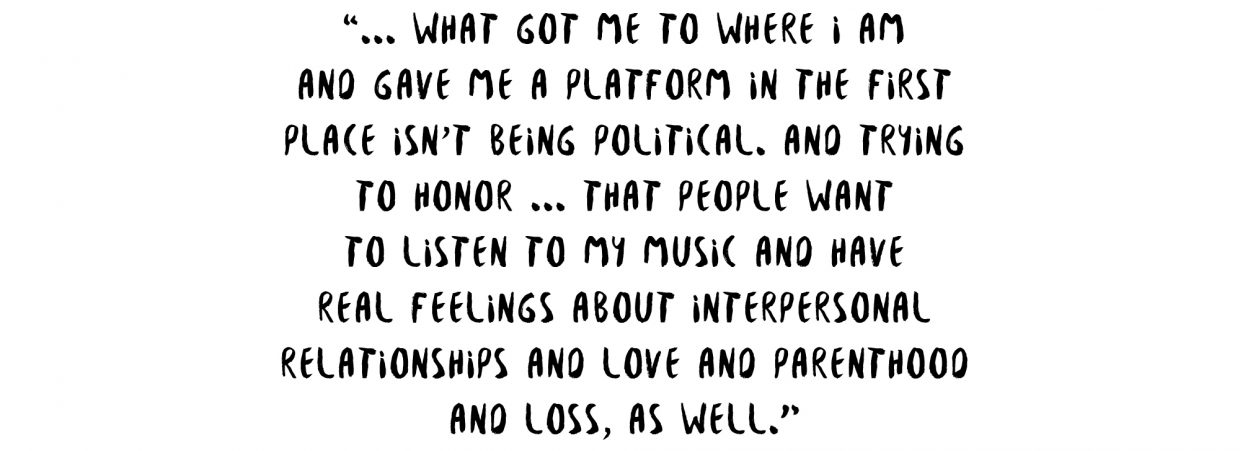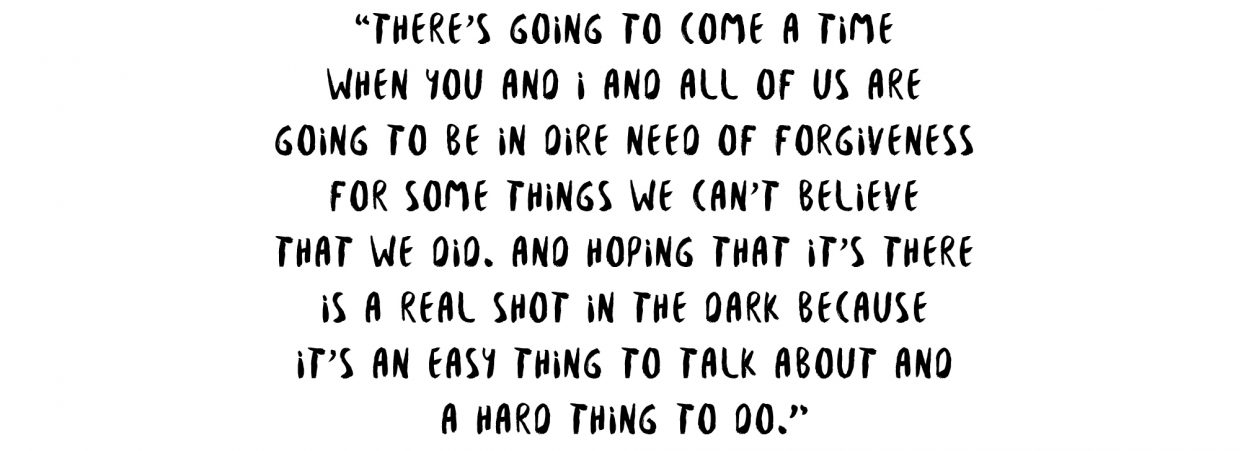“A lot of times, as artists, we don’t write about what we’re good at; we write about what we struggle with,” Brandi Carlile confesses, then adds with a laugh, “I think I tend to write a lot about forgiveness because I’m quite judgmental. I’m a work in progress.” As evidenced in that thesis statement and the work’s title, forgiveness — for ourselves and others — is the tie that binds her new musical masterpiece, By the Way, I Forgive You.
Co-produced by Dave Cobb and Shooter Jennings, and filled with ’60s and ’70s folk-rock flourishes, By the Way, I Forgive You is the album many of Carlile’s fans and critics — as well as Carlile, herself — have been waiting for her to make, as it captures both the expansive power and vulnerable intimacy that make her live shows so indelible and affecting. From the glory and gravitas of “The Joke” to the heart-warming humility of “The Mother,” Carlile — along with Phil and Tim Hanseroth — turned her gaze simultaneously inward and outward, weaving the political into the personal to achieve a new level of honesty in the songwriting and performances.
Carlile and the twins know very well the potency of the musical pen, alluding to exactly that on the album’s buoyantly sentimental opener, “Every Time I Hear That Song.” Aptly, the tune circles around the idea of having memories triggered by a song on the radio. Now 15 years in, Carlile and company have crafted quite a few trigger songs of their own. “I love when I hear that because I know exactly how that feels,” she says. “There are so many activities that, when I do them, I’ll make a playlist and only listen to, like, the Indigo Girls on that camping trip because it’s nostalgia and it’s so important. Certain times in your life are marked by a soundtrack. To be that for somebody else is insanely satisfying for me.
“But ‘Every Time I Hear That Song’ is a little bit different. It’s not really about a song, is it? That’s the least important thing, the song that conjures up those feelings. It’s the fact that they’re still in there somewhere that’s so irritating,” she laughs. This particular album, though, really is about the unique power of a song — or, rather, 10 of them — to conjure up feelings, each one building and bridging toward the next.

A noted activist and humanitarian in her personal life, the closest Carlile had come to drafting a political statement before By the Waywas with “Mainstream Kid” (off 2015’s The Firewatcher’s Daughter) because she didn’t feel that she had the skill required to do it well. Then came November 8, 2016 and all that has followed. And, now, not all bets are off, but a lot of them sure are, with “Hold Out Your Hand” and “The Joke” serving as two particularly political rallying cries.
“I think we all woke up, rather disturbingly, in November of 2016, just to realize that certain epidemics still exist, and we live alongside really damaging forces in the world, especially in our own country,” she says. “Becoming a parent has been a part of it, and wanting to do as much as I can to make the world a better place for my kids, while also recognizing that what got me to where I am and gave me a platform in the first place isn’t being political. And trying to honor that — that people want to listen to my music and have real feelings about interpersonal relationships and love and parenthood and loss, as well. So striking that delicate balance and just honoring the times we live in were really important motivators for me, on this record.”
The humanity required to see and strike that balance is, perhaps, Carlile’s greatest gift. It’s in the way she connects with people en masse and in private. It’s in the way she pours everything in her into every note. It’s in the way she exudes sheer joy every time she steps on stage. And it’s in the way she tackles topics almost too tender to touch.
Tales of addiction, abandonment, depression, and suicide have often cropped up on Brandi Carlile records, and By the Way is no exception. Here, “Fulton County Jane Doe” sweetly memorializes an unknown woman found dead in Georgia and “Sugartooth” sympathetically recounts a high school friend’s lost battle with drug abuse, while “Party of One” compassionately resolves to live up to personal promises made to a partner.
Carlile can tell these stories because she has lived these stories. “There’s nothing unique, really, about me,” she offers. “I’ve got all that in my family and all that in my life, too. I’m coping with it right alongside you and everybody else in the world. I think that God gave me the privilege and gift and ability to write about it, and I’m just really happy to be able to do that.”
Because of all she has dealt with in her life, one of the tools Carlile employs in a lot of different situations is the Al-Anon philosophy of love and acceptance: “I find it to be a really versatile philosophy to love someone just because they are worthy of being loved and not because they are meeting your expectations. That is easier said than done, but so important to experience growth.”
Confusing co-dependency with commitment is another addiction-related thread that has run through multiple albums. In keeping with the spirit of forgiveness and signaling a spurt of growth, Carlile takes that on in “Whatever You Do,” albeit with a newfound confidence that comes from counting yourself in the equation rather than succumbing to invisibility. “It’s all there — all of that gravity around having a savior complex and realizing how, subconsciously, we decide at a young age to love each other within the boundaries of what sustains us personally,” she says. “Realizing how necessary it is to let go of that is sort of groundbreaking.”

Across the final 45 seconds of the song, Carlile wails into the wind. What did that symbolize for her? “That it’s not easy,” she says with a laugh.
But Carlile didn’t sign up for easy. She signed up for real … in all its unfathomably beautiful and inestimably horrible glory.
“The kind of white-washing of humanity and saying that everyone’s just doing the best they can and trying to exist at any given time means that we’re not really capable of great things, either,” she explains. “Because, if we’re not really capable of awful things, we’re not capable of great things. It’s the high-highs and the low-lows that are real life. That’s why forgiveness is so necessary — and accountability is so necessary — in our little speck-of-dust lives. That’s what makes the really good shit happen.”
That philosophy of living up to our highest potential against every possible odd is what pulses so profoundly through “The Joke,” the album’s centerpiece. The stunning cut serves as an anthem of empowerment for the marginalized and vulnerable who face bullies and barricades in life. Forgiveness is found there, too. In order to rise above those who would hold us down, it has to be.
“That’s the thing about transgression and grief and fallibility: There’s going to come a time when you and I and all of us are going to be in dire need of forgiveness for some things we can’t believe that we did. And hoping that it’s there is a real shot in the dark because it’s an easy thing to talk about and a hard thing to do,” Carlile says. “At the end of the day, though, if we do it, we have longer lives and we’re happier people.”
Photo credit: Alysse Gafkjenh